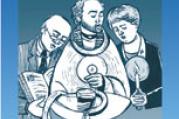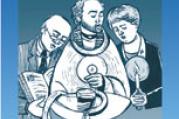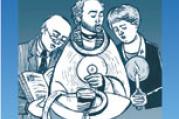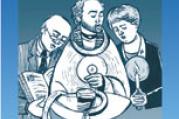Click here if you don’t see subscription options








Catholicity as Catholic
The Rev. Richard P. McBrien’s presentation of reasons for not seeking a mandatum (2/12) seems to rival the proposed mandatum itself in its problematic character. Here I wish to note only two of the questionable aspects of the article.
1. The author wonders: Why are the mandates limited to theologians, while chemists, biologists, philosophers, etc. are let completely off the hook? And he goes on to say, If we are really concerned about the Catholic character of our universities, we should be concerned about the whole faculty and the whole administration, not just the theology department.... Is it asking too much that the drive to insure Catholicity be itself catholic in scope?
It is indeed a noveleven if unpersuasiveargument that the mandatum requirement is too narrow rather than too much. Anyone who has read either Ex Corde Ecclesiae or its Application by the U.S. bishops knows well that in these documents the drive to insure Catholicity encompasses very explicitly every aspect of a university. Account, of course, is taken in the documents of the variety of roles and functions within a university; consequently the drive toward Catholicity is seen as finding expression in many diverse but analogous ways within the university rather than exclusively in a single mode. With regard to the theology department, the drive is expressed as a drive to insure that the theology taught in the university corresponds to church teaching, and it issues in requiring a mandatum to teach theology.
One may or may not believe that with regard to theology departments the mandatum requirement is the best practical conclusion to be drawn from the premise of insuring Catholicity. But the suggestion that requiring the mandatum only within the theology department betrays a lack of concern for the Catholicism of other areas of the university cannot be taken seriously by anyone who attends to the official documents themselves and can grasp analogical thought.
2. Father McBrien acknowledges the need for the dialogue on the Application between bishops and university presidents to continue, but now it will have to involve theologians. The participating theologians are to be selected by the officers and board of directors of the Catholic Theological Society of America (C.T.S.A.). Not only may bishops not select the theologians whom they are to consult; they also may not reject by veto any selection made for them by the C.T.S.A.
For several reasons it is noteworthy that, in the proposal, the C.T.S.A. should arrogate to itself exclusively the prerogative of choosing the theologians for the bishops to consult. First, one might reasonably expect that the bishops themselves would have at least some exercise of freedom in the matter. Second, the C.T.S.A. is not the only national professional society of theologians. Third, some theologians with the credentials and stature of an Avery Dulles, S.J., or a Matthew Lamb have averred publicly in recent years that not all theological voices are finding effective expression in the C.T.S.A.
On learning of Father McBrien’s proposal, the president of another national professional society of theologians, Theresa Moser, R.S.C.J., of the College Theology Society, wrote to America that this society, too, should be involved in the selecting of the theologians whom the bishops would consult. But so far a third national society, the Fellowship of Catholic Scholars, has apparently not sought to find a place in the group to appoint the theological consultors.
Father McBrien’s proposal would have greater credibility if it appeared more as the expression of a desire to see all theological viewpoints represented in the dialogue with the bishops rather than as the embodiment of a tendency to have one group of theologians in a position to determine which theological voices will be heard in the dialogue.
Norbert J. Rigali, S.J.
University of San Diego
San Diego, Calif.
Balanced Expression
I want to congratulate you for that beautiful cover by Darrel D. Nelson on the Jan. 29 issue of America. Of course, I religiously read the whole magazine as soon as it comes and enjoy the balance of theological expressions. Could that cover be made into holy cards, or certificates that could be used for commissioning of D.R.E.’s, catechists, teachers and anyone who teaches the word of God?
David Belongea, O.F.M.Cap.
Appleton, Wis.
Admonition and Advice
I want to concur strongly with the recent observations of Mr. Giancoli (Letters 2/12). I applaud the stand of America on the importance of social justice, but I need and want the spiritual nurturing America so aptly provided in the past. The page content of the magazine also appears to have diminished as its focus narrowed. Please return to a broader content with the admonitions to our conscience placed in better balance with advice for our souls.
James J. Scott
Wildwood, Mo.
Minding the Store
I was shocked and saddened by the report in your Signs of the Times (2/12) that Priest AIDS Deaths Twice That of Adult Male Population. The thought that immediately came to mind was what were the pastors, superiors and bishops, the men who were supposed to be minding the store, doing while all this was building up?
Paul Brady
Clymer, Pa.
The Gospel According to...
Thank you for the new comic section in America (2/12). Peanuts has been taken away from us, but America has responded. I enjoyed the cartoon about the recently retired Navy chaplain. But I must say I got many more laughs from the hilarious article that surrounded it: the one explaining why the Rev. Richard P. McBrien is not seeking a mandate from any bishop to teach at a Catholic university. He suggests that the proper people are not being consulted and that, in his mind, the officers of the Catholic Theological Society of America should be recognized as the real experts. That one really wowed me. Then, when I read about how thoroughly sound the theological departments are at the universities with which he has been associated, I just doubled over with laughter. What a tremendous sense of humor that man has! Finally, at the end of the article, Father Richard indicates that he, of all people, is going to show us the middle way. I just about split my sides on that one.
Keep up the good work, America. Charlie Brown and Lucy were funny, but they were never like this.
Edward V. Griffin, O.S.A.
Philadelphia, Pa.
Perspectives Ignored
Like the Rev. Richard P. McBrien (2/12), I too have been struck by the theologians’ absence from the round of discussions that have taken place between bishops and college/university presidents on Ex Corde Ecclesiae. Even more striking has been the dearth of lay Catholic voices as the process has unfolded to date. The fact is, it is this body of the churchthe lay Catholics who serve as faculty, administrators, students and staffthat not only constitutes the academic institutions’ core Catholic element; it is the laity that comprises the mission that is U.S. Catholic higher education today.
My concern is not only that presidents and bishops have been allowed to gloss over, even ignore fundamental theological issues. More importantly, the insights and perspectives of the U.S. church’s lay theologians, those Catholics for whom theology is both an ecclesial vocation and a profession, a means to support self and family, have gone unheard. Certainly it is this group that has the most at stake in respect to all decisions on the

